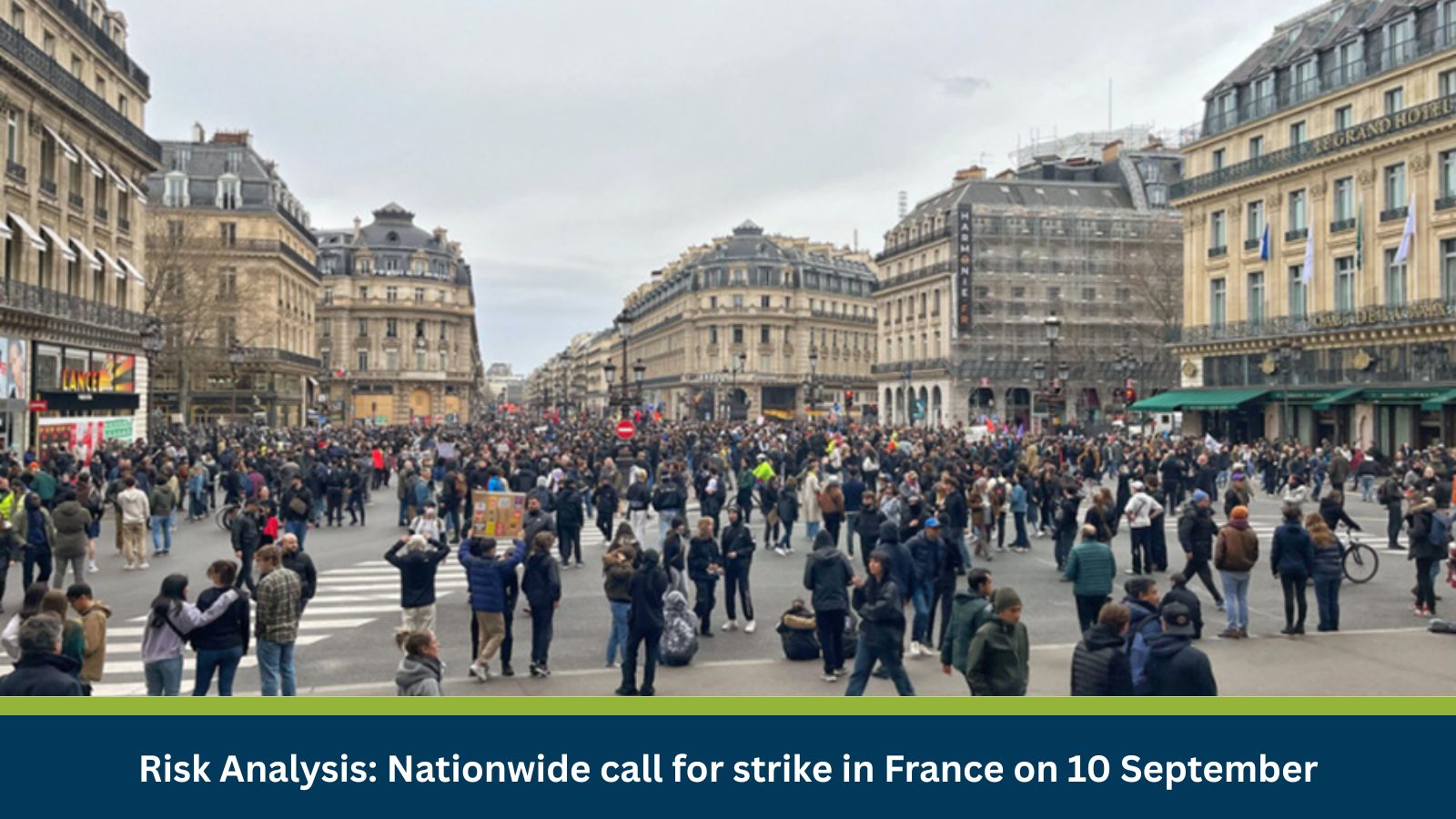What is Risk Analysis in the Context of Civil Disturbance Events?
A civil disturbance is a public event that can disrupt the normal functioning of a city. For this nationwide strike in France, a risk analysis is crucial to prepare for potential operational challenges, including transport paralysis, localized civil unrest, and operational impediments. The analysis helps businesses and individuals mitigate the impact of widespread protests and civil unrest, drawing insights from similar historical events like the pension reform protests (2023) or ‘Gilets Jaunes’ movements (2018-2019).
Executive Summary
- Date of Incident: 10 September 2025
- Location: France
- Risk Category: Civil Disturbance
- Severity Score: 4/5
- Confidence Level: 85%
A nationwide call for a general strike in France on Wednesday, 10 September, poses a significant, short-term risk to business operations and public safety. Past events demonstrated the potential for significant transport paralysis, localized civil unrest, and operational impediments. The proposed strike is likely to impact urban centers and key transport arteries, with a high probability of affecting rail, road, and potentially air travel.
Known Hotspots and Sensitive Areas
High-risk sensitive areas include government buildings (e.g., Élysée Palace, National Assembly) and ministries in Paris, major city halls (Hôtel de Ville), regional prefectures, and key public squares (e.g., Place de la Concorde in Paris, Place Bellecour in Lyon). Major transportation hubs such as Gare du Nord, Gare de Lyon, and Paris Charles de Gaulle (CDG) Airport are also primary targets for protest action.
Impact on Transportation and Services
- Travel & Mobility: Extensive cancellations and delays across train (SNCF) and local public transport (RATP) services, significant road blockades disrupting vehicle movement, and potential for flight cancellations.
- People Safety: Similar historic events involved significant clashes between demonstrators and security forces, resulting in numerous injuries to both protestors and police, and in rare cases, fatalities.
- Business Operations: Nationwide strikes typically lead to substantial employee absenteeism, reduced footfall for retail and services, and forced closures.
- Supply Chain & Logistics: Road and rail blockades, coupled with disruptions at ports and distribution centers, invariably lead to delays in goods transportation.
- Asset Security: There is an increased risk of vandalism, property damage, and looting targeting businesses, public infrastructure, and government buildings.
- Infrastructure & Utilities: Strikes by public service and utility workers can lead to service interruptions such as localized power cuts or disruptions to water supply.
Recommended Actions
- Implement a Flexible Work & Commute Plan: Mandate remote work for all non-essential personnel where feasible. For critical on-site staff, organize alternative transport (e.g., company shuttle, carpooling incentives, temporary accommodation near work) and adjust shift schedules.
- Proactively Manage Supply Chain & Logistics: Contact all key French and cross-border suppliers and logistics partners to confirm their strike contingency plans and potential impact on deliveries.
- Communicate & Maintain Customer Service Continuity: Issue a proactive communication to French and international clients, partners, and stakeholders detailing potential service disruptions. Establish clear alternative communication channels.
- Enhance On-Site Security & Operational Resilience: Increase security presence and surveillance at all French facilities to mitigate risks from potential localized blockades or demonstrations.
- Activate & Coordinate Crisis Response Team: Convene the Business Continuity or Crisis Management Team to monitor the evolving situation, coordinate internal responses, and ensure adherence to French health and safety regulations.
Emergency Contacts
- Police: 17
- Fire Department: 18
- Ambulance: 15
- National Emergency: 112
Final Thoughts
The baseline scenario anticipates a significant, single-day event on 10 September, primarily affecting public transport and leading to widespread but localized protests. A moderate escalation could see the strike extend beyond a single day, or trigger follow-on, spontaneous protests with more intense and widespread clashes. A severe escalation, though a low probability, could act as a catalyst for a broader, sustained period of social unrest.
Stay ahead of operational risks with real-time alerts, scenario modeling, and expert advisories with datasurfr’s Predict. Start your 14-day free trial of Datasurfr’s Risk Intelligence Platform today.






